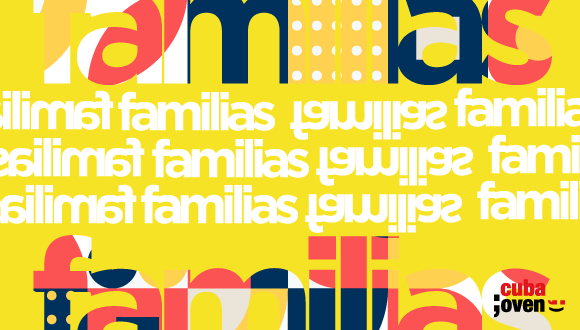
After a broad popular consultation, the Family Code was approved in the recent session of the National Assembly of People's Power (ANPP) to be taken to a popular referendum on September 25.
Oscar Manuel Silvera Martínez, Minister of Justice and member of the Code drafting commission, began his speech at the Round Table by saying that approval is achieved through collective work that is the result of many years of study, analysis and research by many people. from different areas of knowledge. "He also has a current and future vision of Cuban society."
Today's Family Code - he indicated - is a reflection of reality and is supported by solid scientific, demographic, legal arguments and from the point of view of pedagogy, psychology and sociology.
“It is a highly complex regulation that impacts everyone. It is a permanent search for consensus. This explains why so many versions. The important thing has always been and continues to be that it be a Code for everyone, beyond the slogans”, highlighted Silvera Martínez.
The Minister of Justice said that they had the duty to reflect society, but complying with the mandates of the Constitution of the Republic of Cuba and the internal Code itself.
The popular consultation process –he highlighted- he allowed to have a document that is the result of everyone's contribution, it is a collective work.
In this process, whose results were known on May 15, 6,481,207 Cubans participated (75.93%), 61.96% of whom expressed themselves in favor of the text. A total of 79,192 meetings, of which 1,159 abroad and 73,211 in labor and student groups. 336,595 interventions were recorded and 434,860 proposals were processed.
In three days of work of the drafting commission, 275 interventions were made, reported the Minister of Justice. He added that version 25 presented to the National Assembly of People's Power was more solid because it was impregnated with the wisdom of the people. "The exercise of popular participation in the creation of regulations was fully guaranteed."
Oscar Manuel Silvera Martínez indicated that as a result of this process, 47.93% of the general text and 49.15% of the total articles were modified.
The specialized consultation marks -he said- a milestone in the creation of regulations carried out from September to October 2021, in 47 institutions in the country. Version 22 that derived from the result of the specialized query had 60% of its content modified.
Why is the Code approved by the National Assembly? In answering the question, the Minister of Justice recalled that article 103 of the Constitution of the Republic states that the National Assembly is the only body with constituent and legislative power in the country. The Constitution itself includes in its transitory provision XI that, in addition, in the case of the Family Code, popular consultation and referendum should be held.
Both for the popular consultation and for the referendum, he said, the ANPP is required to approve a document. He recalled that for the popular consultation, a version was approved in December 2021 and now for the referendum the Code was approved. “The result of the referendum determines the final approval of the Family Code”
"Our people overwhelmingly supported the Code in the consultation," said the Minister of Justice. He reiterated the consistency of this legal document with the Constitution of the Republic.
"Issues related to marriage, de facto affective unions, adoption and assisted reproduction techniques remained as they were essentially submitted to the popular consultation process," he said.
He added that they had changes to improve and clarify, but they were maintained because not enabling these institutions for all people would be limiting principles and values inherent to the Constitution and society, such as human dignity, equality and non-discrimination.
Silvera Martínez asserted that there was a duty to enable the institution of marriage, de facto affective unions, to promote the adoption of people regardless of other elements.
"The Code has the function of protecting the options that people adopt in their family environment, not protecting it from a legal point of view is discriminatory and causes damage," she explained.
In addition, the minister commented that the positive notion of upbringing without violence was maintained in the approved project, because it is consistent with the Cuban humanist essence and because the country has assumed obligations with international treaties, such as the Convention on the Rights of the Child.
“We also leave in the text the idea of maintaining parental responsibility, a concept that is part of the way in which our people currently manage the upbringing of their children. It is not consenting to everything. Here the minors participate and most of the families keep them away from the violence”, said Silvera Martínez.
Another concept that continues in the Code that will be submitted to a referendum in September is progressive autonomy. This institution gives children a leading role in their daily relationships, in their family environment, as they do at school and in the community.
According to Silvera Martínez, these were the issues that generated the most debate in the consultations. In this regard, Dr. Yamila González Ferrer, vice president of the Union of Jurists of Cuba, explained that the interpretations of the population were taken into account in preparing the final text.
“That 61% support implies an understanding of the magnitude of the Code. We are not imposing models, we are responding to current realities, with a tool to defend the rights of people who may currently be unprotected, ”she assured.
Among the novelties of the text, the expansion of the “Wherefore” stands out. One of them is the one that recognizes, precisely, popular participation and its significance for the transformation of the Code.
According to González Ferrer, the popular consultation allowed certain achievements, such as incorporating care from affection as a right of people in the family environment. The protection of children and adolescents in exceptional and disaster situations was also expanded, as a result of a proposal from the Ministry of Education.
CUBADEBATE





Read more...